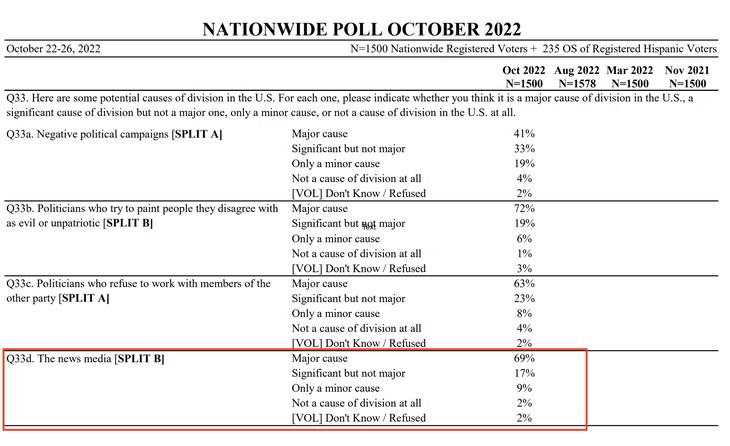Most Americans have coalesced around the belief that if there is one overriding cause for the discord in this country–worse even than politicians demonizing others for votes–it is the Mainstream Media’s forcing a narrative down our throats.
It’s impossible to get 86% of people to agree on the color of the sky, but 86% of Americans believe that the MSM is the major or a significant cause of division in America. Nearly 70% says it is a major cause. From Tuesday’s Wall Street Journal poll:

The media deserves every bit of scorn we can heap on it, and far more than I alone am capable of providing. Please join me in a 2 minutes hate for the media.

The media is so awful both to push their own ideological agenda and to make money. Anger moves people. And people feeding that anger get more viewers than those who don’t. Division is their moneymaker, and it has the advantage of motivating their folks to a frenzy.
One thing you don’t see often, though, is a major media figure actually admitting that they are indifferent to the truth and disdain the use of reason in public debates. So I guess we should thank Jim Cramer, CNBC’s famously incompetent media personality, for openly admitting that he thinks speaking the truth plainly is a bad idea.
Not that we didn’t already know that is how he and his colleagues feel, but it is kinda refreshing to see a media figure openly pine for a modern-day Tokyo Rose.
CNBC’s Jim Cramer praises state-run propaganda, stuns co-hosts into silence pic.twitter.com/yD6ohtxtXq
— End Wokeness (@EndWokeness) November 1, 2022
You have to watch the clip, because it is amazing. Even his colleagues think he is nuts for saying what he did.
I have watched it several times because it is so bold, so awful, and so ridiculous that it is mesmerizing. A guy on a purportedly serious financial news outlet flat out admit that he thinks that using propaganda to direct the behavior of people is good and right. Openly admitting it? Wow.
Of course Cramer is famous for being a propagandist himself. He participated in the destruction of billions of dollars of wealth held by his viewers by touting Meta (Facebook) stock all the way down during its crash. He kept on imploring his viewers to buy on the dip.
JIM CRAMER TEARS UP AND ADMITS HE WAS WRONG ABOUT FACEBOOK $META
THIS IS THE FIRST TIME I HAVE EVER SEEN HIM ADMITTED HIS MISTAKE pic.twitter.com/4382Om950x
— GURGAVIN BLOOMBERG (@gurgavin) October 27, 2022
META’s value has dipped 70% this year. That is remarkable in itself, but Cramer’s willingness to tout this stock despite its obvious problems is unaccountable.
Or perhaps it is, given his admission that he doesn’t believe that the truth is a value that should be placed above all others.
If this were just Jim Cramer, it would be notable but hardly Earth shattering. But does anyone believe that what Cramer admitted out loud–that propaganda, not truth is to be put at the top of the rhetorical hierarchy–isn’t the view of most people in the Mainstream Media? After the past 3 years, or 6, or the past few decades it is blindingly obvious that the media doesn’t care about the truth.
Erik Wemple, media critic at the Washington Post, just admitted that he kept silent about the corruption of truth in the media to protect his own career, and obviously others do the same thing. There is a Narrative™; it is poison to go against it. So almost nobody in the media does. Wemple actually admitted that he spread what amounted to propaganda from The New York Times–lies they told to cover up their spinelessness–for career purposes. John wrote an excellent piece about this the other day, and I encourage you to read it.
You may or may not recall that back in 2020 The New York Times published an Op/Ed by Senator Tom Cotton on the Black Lives Matter riots. The Times newsroom erupted, and in the wake of the controversy the editor James Bennet, who published it, was essentially fired, and Bari Weiss left soon thereafter to start Common Sense, a wildly successful Substack.
It was a telling moment, revealing the inner workings of the new woke media and the enforcement of The Narrative within the MSM.
James Bennet, the editor whose career was destroyed, has been unsurprisingly quite vocal about the affair, but few others in the media have been. They simply shut up and complied with The Narrative. Wemple is apologizing for his role in the disgusting affair:
To date, the lesson from the set-to — that publishing a senator arguing that federal troops could be deployed against rioters is unacceptable — will forever circumscribe what issues opinion sections are allowed to address. It’s also long past time to ask why more people who claim to uphold journalism and free expression — including, um, the Erik Wemple Blog — didn’t speak out then in Bennet’s defense.
It’s because we were afraid to.
On June 1, 2020, Cotton tweeted suggesting military intervention against unrest in U.S. cities stemming from the Black Lives Matter protests. “Anarchy, rioting, and looting needs to end tonight. If local law enforcement is overwhelmed and needs backup, let’s see how tough these Antifa terrorists are when they’re facing off with the 101st Airborne Division. We need to have zero tolerance for this destruction,” he wrote. Twitter threatened to censor Cotton’s account over the comments but ultimately took no action.
According to two sources, Cotton’s initial pitch to the Times focused on Twitter’s alleged overreach in moderating its platform. The Times opinion section, however, was less interested in the social media dimension than the policy itself. Cotton’s office,which had previously published two op-eds in the Times — on the case for buying Greenland and a defense of the U.S. killing of Iranian Maj. Gen. Qassim Suleimani — got to work. It delivered a 950-word essay exploring invocation of the Insurrection Act against rioters who destroyed property, and worse, amid the otherwise peaceful protests over the murder of George Floyd.
It was published on Wednesday, June 3, under a headline written by the Times: “Tom Cotton: Send In the Troops.”
A backlash swiftly combusted, with Times staffers at the forefront of the critique. Nikole Hannah-Jones, creator of the Pulitzer Prize-winning 1619 Project, tweeted that the paper should have done a news story to push back against Cotton’s ideas, as opposed to “simply giv[ing] over our platform to spew dangerous rhetoric.” Astead W. Herndon, a national politics reporter, made a similar point, tweeting that “if electeds want to make provocative arguments let them withstand the questions and context of a news story, not unvarnished and unchecked.” There were other persuasive broadsides against the decision to publish Cotton.
The controversy didn’t originate outside the Times–it came from within. The very reporters whose job it is to inform us about what is happening in the world–and what people of all persuasions think about it–erupted because a voice with which they disagreed was allowed to share an opinion. A sitting US Senator–obviously a newsmaker of note, said something that millions of Americans agreed with, and should have been silenced or at least challenged by a reporter. The Times staffers ridiculously claimed that they were “endangered” by an Op/Ed.
Many Times staffers, however, forwent the rigor of argumentation and tweeted out the following line — or something similar — to express their disgust: “Running this puts Black @NYTimes staff in danger.” The formulation came from the internal group Black@NYT and received the blessing of the NewsGuild of New York as “legally protected speech because it focused on workplace safety,” Smith, then the Times’s media columnist, reported at the time.
The “danger” tweets — along with a letter from Times employees slamming the op-ed — landed with impact. Although Sulzberger initially defended publication as furthering the “principle of openness to a range of opinions,” he bailed on that posture within hours. By the afternoon after publication, the paper had determined that the piece failed to “meet our standards,” according to a statement.
This, Wemple reports, was simply a lie. The Times commissioned a second fact check to justify the decision to denounce their publication of the piece, and the second fact check confirmed the initial one: the piece met the Times’ standards. It was the opinion, not the facts, that were unacceptable to the Times’ staff.
In other words, what the Times put out was propaganda, and what Wemple and others did was knowing spread that propaganda.
At the time, Wemple reported the Times’ bull crap version of the controversy, covering for the woke idiocy of the decision to denounce the mere publication of an opinion piece by a Senator. After more than 2 years Wemple cried mea culpa. And good on him. I respect that. It must have been very hard indeed.
Our criticism of the Twitter outburst comes 875 days too late. Although the hollowness of the internal uproar against Bennet was immediately apparent, we responded with an evenhanded critique of the Times’s flip-flop, not the unapologetic defense of journalism that the situation required. Our posture was one of cowardice and midcareer risk management. With that, we pile one more regret onto a controversy littered with them.
But with that admission comes a reminder of how the media really works: if you want to keep your job, keep your mouth shut and push the established Narrative™. Bari Weiss refused to do it and gave up her cush job at the Times.
By the way, you simply must read Ed’s piece on how the MSM completely ignored the bombshell revelations about the censorship efforts of Homeland Security; it is another piece of the propaganda puzzle.
What Jim Cramer did yesterday live on TV is simply say what most people in the MSM seem to believe: propaganda, not truth, is the product sold by the MSM.







Join the conversation as a VIP Member